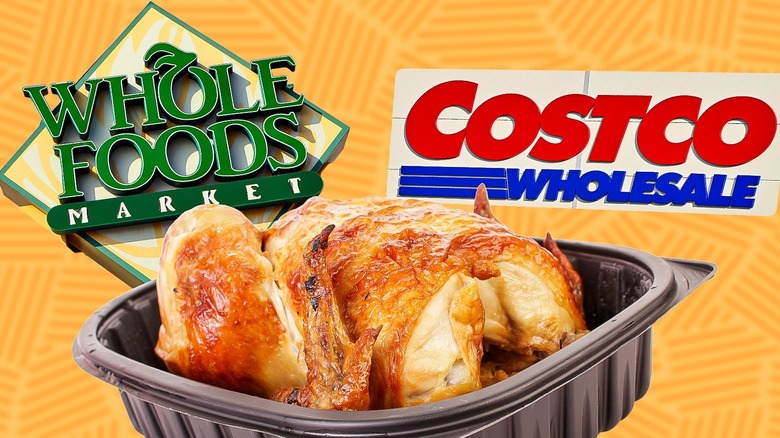Costco Vs Whole Foods: The Difference Between Store-Bought Rotisserie Chickens
When you're short on time and big on hunger, grabbing a juicy, golden rotisserie chicken from the grocery store will often satisfy both things, and it's budget-friendly to boot. It feels like every major grocery store chain has its own subtle spin (yes, that's a pun, you're welcome) on rotisserie chicken. We wanted to look at the similarities and differences between Costco rotisserie chickens vs. Whole Foods rotisserie chickens to see how much variety there is between store brands. What we found is that major differences lie in the price, size, ingredient list, and taste.
You get a better deal at Costco when it comes to price per pound as well as options to get a bigger bird in general. However, it likely comes as no surprise that Whole Foods is the winner when it comes to healthier, more organic options. As for taste, it's largely up to your own personal preferences, as well as how you use your rotisserie chicken. If you're eating it straight off the bone, you might enjoy the Costco chicken more for its juicy, flavorful meat. If you're using your rotisserie chicken in a dish like tacos or chicken fried rice, you might want a simpler bird that will pick up the overall ingredients featured in the meal.
A closer look at the differences
Let's do a price comparison first. As you can imagine, Costco, known for its exclusive, wholesale deals, had the more affordable bird at $5 for 3 pounds. Whole Foods, known for its higher-end organic options, did not offer such a steal. At Whole Foods, the Organic rotisserie chicken was priced at $6.28 per pound — well over 3 times the cost of a Costco chicken, though prices are subject to change.
Next, let's look at size. Costco guarantees a 3-pound chicken with its $5-for-3-pounds deal. That's a lot of poultry the could feed a whole family or more. The rotisserie chickens at Whole Foods tend to be smaller at between 1-2 pounds.
The other varying factor is the ingredient list. This is where Whole Foods, understandably, shines. Costco's Seasoned Rotisserie Chicken comes with a handful of unrecognizable ingredients, including hydrolyzed casein, sodium phosphates, and monoglycerides, and diglycerides. The Whole Foods chicken has just three ingredients: Chicken, salt, and pepper. It also comes with an organic certification and is deemed low sodium amongst other diet-friendly factors.
Finally, we come to taste. Ultimately, it's all about what you want to get from your rotisserie chicken. Because Costco offers a bigger chicken, it tends to be juicier and more flavorful due to injected additives. Whole Foods, on the other hand, keeps the ingredients simple but struggles to hit the moisture and flavor of the Costco chicken.

